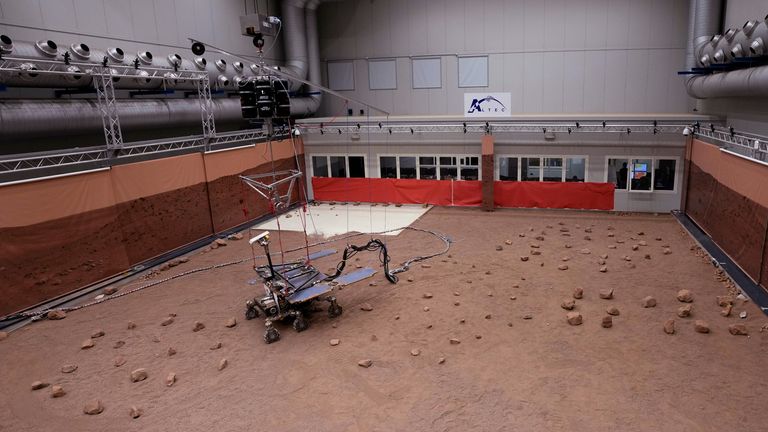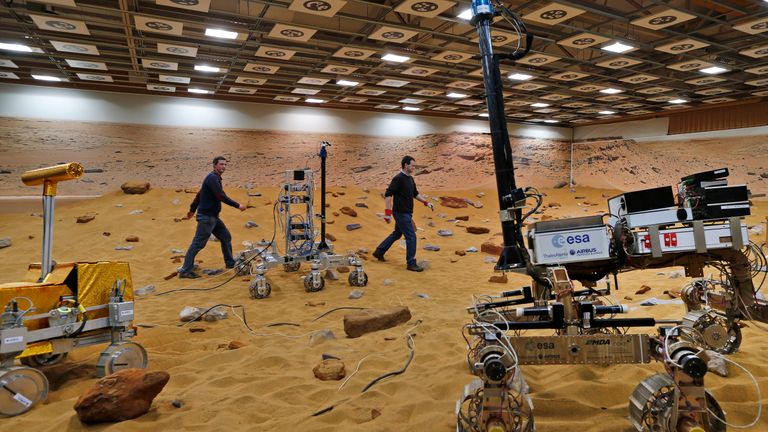[ad_1]
Europe’s mission to search for evidence of life on Mars is likely to be on hold for several years as a result of Russia’s invasion of Ukraine, Sky News has been told.
The British-built ExoMars rover was due to launch in September on a Russian rocket and descend to the surface of the red planet on a Russian lander.
But sanctions have grounded the mission, most likely until at least 2026, and the European Space Agency (ESA) has yet to propose a plan B.
Russians may be using ‘banned’ thermobaric bombs on steelworks – Ukraine news live
David Parker, ESA’s director of human and robotic exploration, said the agency’s 22 member states, including the UK, could opt to continue the mission with another partner – or attempt to reach Mars alone.
“We propose, they decide,” he said.
“It’s precious cargo. If we are going to do it, we need to be sure we are going succeed.
“That requires investment, the technology development, and the preparation and testing to get us there.
“But, in a sense, it is going back to what we long ago foresaw, which was to have a fully European mission to go to Mars.
“What we may do is talk to NASA to see if there are contributions they can make.”
That could include US-made retrorockets to slow the landing craft as it makes its final approach to the surface.
But Europe would still need to fill many of the gaps left by the Russian space agency, Roscosmos.
It could use a new version of its powerful Ariane rocket to launch the rover – and attempt to piece together technology used on earlier European space missions for the descent through the perilously thin Martian atmosphere.
“We have most of the building blocks that we need,” Mr Parker said.
The ExoMars mission has had to overcome a series of setbacks.
It was originally due to launch in 2018 but was delayed by two years when NASA pulled out for budget reasons.
The COVID pandemic and problems with the descent parachute led to a further delay to 2022.
Where is the rover now?
The rover – named Rosalind Franklin after the British DNA pioneer – is currently in Turin in an ultra-clean room to prevent biological material from Earth from contaminating Mars.
But Francois Spoto, the Mars Exploration Group leader at ESA, said the prospect of prolonged storage has led to new engineering challenges, not least preventing damage to the rover from Earth’s stronger gravity.
“The load on the wheels, the mechanisms – this is what we try to preserve,” he said.
“Storage over a long period of time without taking care of those difficulties could be a degrading factor for the performance of the rover.”
The rover may also need to be dismantled for further maintenance and cleaning before being declared fit to fly.
Will the ESA work with Russia again?
ESA doesn’t rule out working with the Russian space agency again, once peace is restored in Ukraine.
It also collaborates with China.
But Mr Parker said the delay to the ExoMars mission has highlighted the risks of close cooperation with other agencies.
He told Sky News: “The clear message is that very ambitious space programmes require choices. Either reduce costs by cooperation and accept the risks, or choose the route of full autonomy.
“But that has a higher price tag of investment associated with it. There is no simple answer to this.”
[ad_2]



